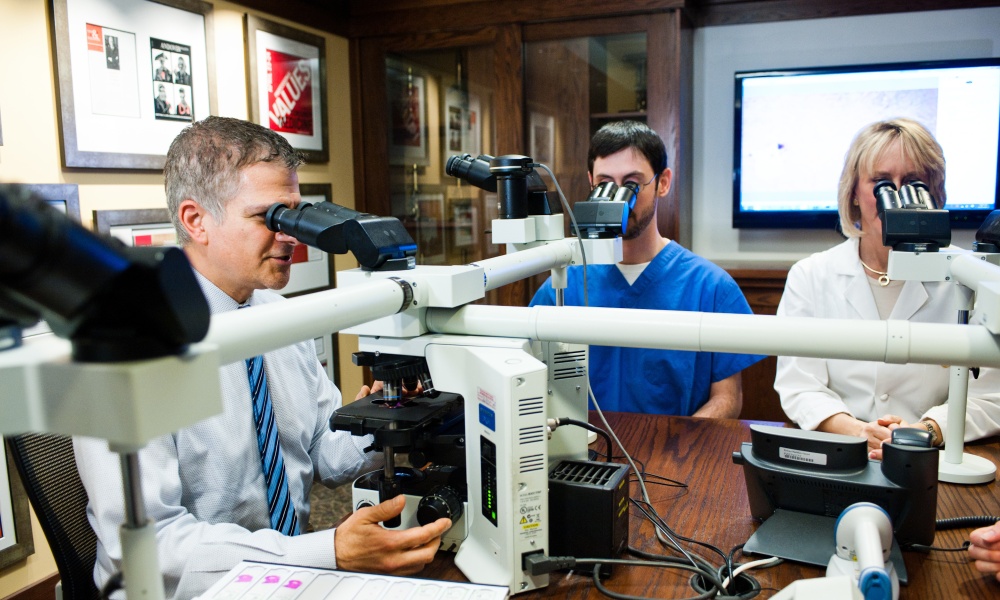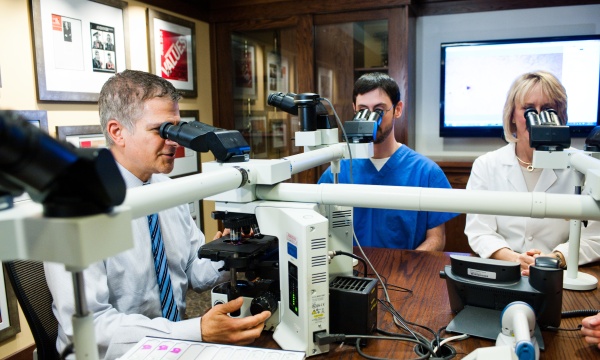Neuropathology Fellowship


Contact Information
Maria Martinez-Lage Alvarez, MD
Director, Neuropathology Fellowship Training Program
Massachusetts General Hospital
55 Fruit Street, Warren 325
Boston,
MA
02114
Phone: 617-724-3493
Carrie Racsumberger
Graduate Medical Education Program Manager
Email: cracsumberger@mgb.org
About the Fellowship
The Neuropathology Program at Massachusetts General Hospital seeks to train individuals who will become leaders in Neuropathology through combinations of basic or clinical research, teaching and the provision of high-quality, state-of-the-art patient care. The philosophy of post-graduate pathology training at Mass General is based on the premise that trainees learn best by being exposed to a wide variety and large volume of clinical material, with a level of responsibility appropriate to their level of experience.
The training program in Neuropathology is a two-year ACGME-accredited program that involves consistent exposure to, and responsibility for, clinical specimens, with supervision and backup from senior trainees and faculty. Interaction with other clinical service in the hospital during the course of patient care is an important part of this experience. Fellows are given graded responsibility to test their knowledge and decision-making capacities. They also learn to evaluate the literature critically, integrate new knowledge into their practice, and present this data at clinical conferences. Trainees are expected to teach in the second-year neuroscience course at Harvard Medical School and to design and carry out at least one independent clinical or basic research project.
Types and Numbers of Appointments
There is one first-year and one second-year fellow each year. Normally one Neuropathology fellowship position is available per year, although the program is approved for a total three trainees at any one time.
Requirements
Applicants must have completed two years of Anatomic Pathology training or be eligible for certification in AP, AP/CP, Neurology or Neurosurgery. Applicants should have already passed USMLE Part 3. Graduates of an international medical school must also have a valid visa and ECFMG certificate.
Applicants for fellowships in Neuropathology must:
- Have completed residency training in Anatomic or in Anatomic and Clinical Pathology acceptable to the American Board of Pathology
- Be eligible for employment and medical licensure in Massachusetts
Goals and Objectives
- Develop knowledge and skills in the techniques and interpretation of frozen section and intraoperative smears and the applications of advanced technology, including image analysis, immunocytochemistry, and molecular diagnostics to neurologic problems of adults and children
- Become proficient in the diagnosis and classification of nervous system neoplasms and of non-neoplastic diseases of brain, spinal cord, muscle and nerve and to be able to effectively communicate these diagnoses to clinical staff
- Learn the performance and interpretation of special techniques utilized in the diagnosis of these diseases, including immunohistochemistry and molecular diagnostics
- Be able to integrate laboratory information, including morphology and basic and advanced laboratory studies and clinical information, and formulate an interpretive report that will provide, in a clear, concise, and complete form, the information needed by clinicians to proceed in the management of the patient
- Become proficient in the presentation of information at clinical conferences and to have the opportunity to present at local and national meetings
- Interact with and effectively teach residents, medical students, clinical colleagues, and ancillary laboratory staff
- Analyze the literature critically, integrate new information into clinical practice, and use systems-based resources to improve diagnostic skills
- Have a basic understanding of the principles of clinical investigation: to design, carry out and publish a study using patient-related information to advance knowledge or to disseminate existing knowledge in the specialty
- Develop an understanding of laboratory management issues appropriate to a diagnostic Neuropathology service
Structure of the Neuropathology Program
The Neuropathology program is a two-year training program, designed to be entered either after two years of Anatomic Pathology training (AP/NP path approved by the American Board of Pathology) or after completion of Anatomic Pathology or Anatomic and Clinical Pathology training. The Neuropathology Service examines about 1500 surgical specimens per year including over 500 intraoperative consultations, 100 muscle biopsies and around 20 nerve biopsies and about 200 brains. Training during the first year is predominantly focused on classification and diagnosis of neoplasms as well as medical diseases of the nervous system. In addition, the first year includes a one-month rotation at Children’s Hospital to expand experience with pediatric and developmental neurological diseases and neuropathology. Trainees present at hospital-wide patient-oriented conferences as well as in teaching conferences for other trainees. Additional teaching experience comes when fellows teach in the Neuroscience Course at Harvard Medical School as laboratory instructors. The second year, the trainees are appointed as the Alzheimer Disease Research Center (ADRC) Neuropathology Fellow and are responsible for the processing and analysis of 65-70 brains with a wide variety of neurodegenerative disorders that are received by the ADRC Brain Bank. This allows them to develop experience in the current diagnosis of neurodegenerative diseases, while they continue their experience in surgical neuropathology and frozen section diagnosis.
Graduated Responsibility
Fellows take on the responsibility for assisting in the training and teaching of residents from other training programs, including within the Mass General Pathology Departments (AP or AP/CP residents) and from Neurology (both adult and pediatric services). As the year progresses, the fellow is encouraged to write complete reports and to communicate preliminary results to clinicians. In the final 2-3 months on the Neuropathology service, the fellow is given the opportunity to sign out cases independently, showing cases to the attending only when problems are encountered. The attending subsequently reviews and countersigns all cases, but the expectation is that no changes should be necessary to cases that the fellow thinks are straightforward. In this way, the fellow and the program will be able to assess the fellow’s ability to function independently, while maintaining an adequate level of supervision.
How to Apply
Applications for combined AP/NP training should be submitted through the NRMP as described for the AP program, with indication that they wish to be considered for this combined training program. For potential candidates who are already engaged in residency training (AP, AP/CP, Neurology or Neurosurgery), inquiries should be made as early as feasible since positions are often filled several years in advance. Applicants should send a completed CAP standardized Application for Pathology Fellowships, a current CV, 1-page personal statement concerning their interest in Neuropathology, and three letters of reference to:
Maria Martinez-Lage Alvarez, MD
Program Director, Neuropathology Fellowship Training Program
Massachusetts General Hospital
55 Fruit Street, Warren 325
Boston, Massachusetts 02114
Phone: 617-724-3493
Email: mmartinez-lage@mgh.harvard.edu
Carrie Racsumberger
Graduate Medical Education Program Manager
Email: cracsumberger@mgb.org
Our Faculty
Learn more about the faculty supervising this fellowship.
-
![]()
Maria Martinez-Lage Alvarez, MD
- Assistant Pathologist, Massachusetts General Hospital
- Assistant Professor of Pathology, Harvard Medical School
- Associate Program Director for Anatomic Pathology, Massachusetts General Hospital Pathology Residency
-
![]()
- Pathologist-in-Chief, Massachusetts General Hospital
- Benjamin Castleman Professor of Pathology, Harvard Medical School
-
![]()
- Associate Pathologist, Massachusetts General Hospital
- Associate Professor in Pathology, Harvard Medical School



